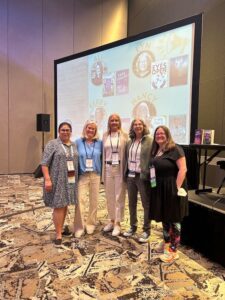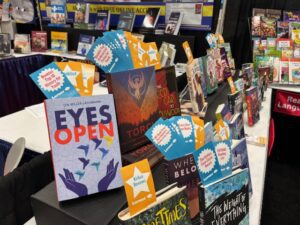Panel Wrap-Up: Disabled Activists
I recently returned from an inspiring two days at the annual conference of the Texas Library Association, also known as TLA or #TxLA. I saw a lot of old friends, including Cynthia Levinson, who encouraged me to finish Torch at a difficult time in my career (I’d lost my agent) and who was promoting her new nonfiction book for middle and high school readers, Who Owns the Moon?. I got to meet Lupe Ruiz-Flores, whose debut middle grade novel The Pecan Sheller, has been getting stellar reviews everywhere, and I discovered that she is the mother of my friend and talented picture book author/illustrator (and musician) Carolyn Dee Flores, who I met at Kindling Words years ago. And I met many new friends, including DeAndra Davis, whose YA novel of an autistic football player and his older brother, a star quarterback, is going to be my next read. All the Noise at Once comes out on April 15, and I’m rushing to Books of Wonder on that day to pick up my copy.
Some 55 people attended the panel that I previewed in my last post, an appreciative crowd that stayed until the end of the conference to see us. The panel titled “Kidlit Quest: Spurring Activism and Social Justice Through Children’s Books,” was moderated by Leander, Texas librarian Becky Calzada, the current president of the American Association of School Librarians. The other panelists were Carolrhoda author buddy Kerry O’Malley Cerra, who organized the panel, Nancy Tandon, and Ali Terese.
We began by talking about our books that explore activism. Ali led off with her 2024 book Free Period and her forthcoming Vote for the G.O.A.T., which feature, respectively, middle school girls pressuring school authorities to put period supplies in the girls’ bathroom and to provide better living conditions for the school mascot. Nancy talked about seventh grader Rory’s decision to stand up to bullies and to forgive a friend who had betrayed him but now needed his help after a terrible accident in The Way I Say It. Kerry highlighted the environmental activism on behalf of endangered sharks in Make a Little Wave, and I focused on teenagers standing up to dictatorship, state terror, and the exploitation of child labor in Eyes Open and Torch.

And here we are with our featured books. From left, Becky Calzada, Nancy Tandon, Kerry O’Malley Cerra, me, and Ali Terese.
One of the striking things about almost all these books — Eyes Open being a notable exception — is that their activist protagonists have disabilities. Both of the main characters in the dual narrative Vote for the G.O.A.T. have physical disabilities. Jo uses a crutch and knee brace and is receiving an experimental therapy for rheumatoid arthritis. Meg has a temporary disability, a sports injury, and resists pressure to return to her soccer team until it is fully healed. As in Free Period, the protagonists of Vote for the G.O.A.T. are learning to be advocates for their own health. When asked about her personal connection to the book, Ali talked about her own experiences with childhood rheumatoid arthritis and later sports injuries, which motivated her to write about activism and advocacy around health. With women’s sports becoming more popular, we’re also becoming increasingly aware of issues related to physical and mental health of female athletes, from the greater incidence of ACL tears to the stalking and harassment of athletes on social media.
Kerry started to lose her hearing when she was 16 years old and now wears cochlear implants. Her novel before Make a Little Wave, Hear Me, portrays a middle school girl who refuses to get the implants and touches on the same themes of self-advocacy that Ali explores. Savannah in Make a Little Wave does have cochlear implants; as Kerry pointed out, there is no “one right way” of living as a deaf person. This new novel is also an example of a book that features a disabled protagonist but is not “all about” the disability. It’s just one part of who Savannah is, along with her fear of sharks and, ironically, her desire to save them from mutilation and possible extinction. At the panel, she talked about the experience of “not being heard,” and said she writes characters who feel that no one is listening to them. That feeling of not being heard is why Savannah makes some counterproductive decisions in her campaign to save the sharks along the Florida coast where she lives.
Nancy based The Way I Say It on her experience as a speech therapist, helping to rehabilitate children with traumatic brain injuries. Rory’s inability to pronounce the letter “r” is particularly hard on him because he can’t even say his own name. The speech therapist at his school introduces him to the life of Muhammad Ali, who couldn’t read because of dyslexia and later in life faced the challenges of Parkinson’s. Rory recites Ali’s famous lines that would be tongue twisters for anyone but especially for him. In doing so, he internalizes these words, which give him the courage to stand up to bullies who are preying on classmates with disabilities and to forgive his former friend for being one of them.

Eyes Open and Torch at the Lerner booth with their accolades. I highly recommend their neighbor, Red Car to Hollywood.
I also talked about the impact of bullying on my work. Having been relentlessly bullied in middle and high school for my odd mannerisms and behavior — what I would learn in adulthood were aspects of my autism — and being obsessed with history, I made the connection between the bullying that goes on in schools, with the strongest students targeting their weaker peers, and societies in which powerful rulers terrorize and rob their people. The dictatorships in my books are of both left (Torch) and right (Gringolandia, Eyes Open). My autistic protagonist Tomáš in Torch alternates between taking comfort in the rules that govern his life and chafing against the hypocrisy that he observes. My reliance on logic and rules as an autistic person gives me a keen sense of when the actions of those in power don’t line up with their beliefs, or when they rule in inconsistent and capricious ways. The autistic character I created, along with his friends who are misfits in other ways, reflects this personal experience as well as my observations from living in countries ruled by dictators or knowing people who survived those regimes.
In the session, we also talked about ways to present books about activism and social justice in libraries where they may be challenged by censors. One approach would be to highlight the books not as “activism books” but as examples of civic or community engagement. Another would be to show how young people, especially boys and young men, can develop a sense of pride through service to others in their communities. In this respect, Nancy’s book and mine offer examples of boys choosing to use their strength and talents to help others, with Muhammad Ali being the kind of role model of both strength and service that can guide boys looking for more positive directions today.









This is a wonderful round up and I surely was honored sharing the stage with you, Kerry, Ali, and Becky. Thank you!
This is a fantastic recap. Thank you, Lyn. It was an important session and I appreciate you agreeing to sit on the panel with us.
This is a fantastic recap. Thank you, Lyn. It was an important session and I appreciate you agreeing to sit on the panel with us.